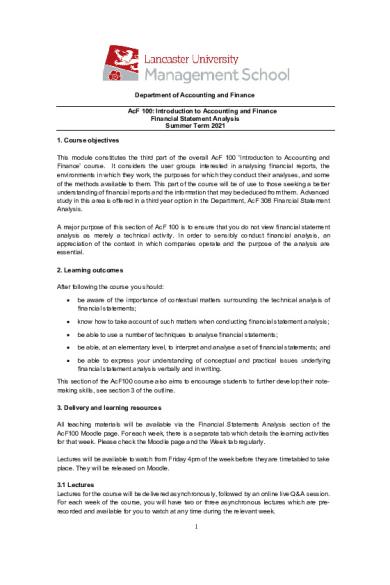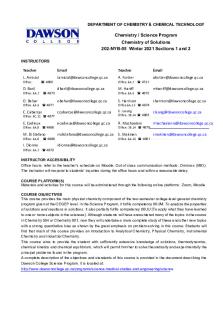Ac F100 FSA 2021 Course Outline PDF

| Title | Ac F100 FSA 2021 Course Outline |
|---|---|
| Author | Jing Guo |
| Course | Introduction to Quantitative Methods |
| Institution | Lancaster University |
| Pages | 4 |
| File Size | 127.6 KB |
| File Type | |
| Total Downloads | 22 |
| Total Views | 139 |
Summary
very helpful materials...
Description
Department of Accounting and Finance AcF 100: Introduction to Accounting and Finance Financial Statement Analysis Summer Term 2021 1. Course objectives This module constitutes the third part of the overall AcF 100 ‘Introduction to Accounting and Finance’ course. It considers the user groups interested in analysing financial reports, the environments in which they work, the purposes for which they conduct their analyses, and some of the methods available to them. This part of the course will be of use to those seeking a better understanding of financial reports and the information that may be deduced from them. Advanced study in this area is offered in a third year option in the Department, AcF 308 Financial Statement Analysis. A major purpose of this section of AcF 100 is to ensure that you do not view financial statement analysis as merely a technical activity. In order to sensibly conduct financial analysis, an appreciation of the context in which companies operate and the purpose of the analysis are essential. 2. Learning outcomes After following the course you should: •
be aware of the importance of contextual matters surrounding the technical analysis of financial statements;
•
know how to take account of such matters when conducting financial statement analysis;
•
be able to use a number of techniques to analyse financial statements;
•
be able, at an elementary level, to interpret and analyse a set of financial statements; and
•
be able to express your understanding of conceptual and practical issues underlying financial statement analysis verbally and in writing.
This section of the AcF100 course also aims to encourage students to further develop their notemaking skills, see section 3 of the outline. 3. Delivery and learning resources All teaching materials will be available via the Financial Statements Analysis section of the AcF100 Moodle page. For each week, there is a separate tab which details the learning activities for that week. Please check the Moodle page and the Week tab regularly. Lectures will be available to watch from Friday 4pm of the week before they are timetabled to take place. They will be released on Moodle. 3.1 Lectures Lectures for the course will be delivered asynchronously, followed by an online live Q&A session. For each week of the course, you will have two or three asynchronous lectures which are prerecorded and available for you to watch at any time during the relevant week. 1
Asynchronous lectures Each week, you will get access to lectures which cover content, as well as practical application of techniques. When appropriate, you will also be directed to the Smartbook version of the textbook, to take self-assessment questions to check your understanding of the material. You will be given information on how to access the Smartbook in a recorded session available on Moodle. We recommend you watch the lectures (including completing the Smartbook reading and selfassessment questions) in advance of the live Q&A sessions. Lectures will be available to watch from Friday 4pm of the week before they are timetabled to take place. They will be released on Moodle. Online live Q&A session In addition to your asynchronous lectures, an online live Q&A session which will allow you to ask lecturers questions about the week’s material will take place each week at: Friday 12 noon – weeks 21-24 Links to this weekly session will be provided on Moodle in the Weekly tab. There is also a link to a form where you can post any questions for the lecturers to answer in this session, and you will be able to ask any further questions in the session itself. 3.2 Workshops Workshops take place in weeks 22-24 (there is no workshop in Week 21), online for 1 hour and allow you to practice techniques and discuss any problems not covered during lectures. You will be allocated to a workshop group and time which will remain the same for each week. These take place in smaller groups. Links to your workshop will be available on Moodle. Workshop attendance will be monitored. Workshops will cover the content of the previous week’s lectures. Your workshop questions will be given details of the workshop questions on Moodle each week. During the workshops you may be asked to work together in workshops with fellow students in smaller online breakout groups to compare answers and discuss any issues. Tutors will facilitate the workshops and answer any questions about the solutions. Please note: Online workshops are compulsory for all students registered on the AcF 100 course. It will be assumed by lecturers and tutors in setting all assessments (coursework and examinations) that students have attended and completed all the work for all the AcF 100 lectures and workshops. 3.3 Smartbook You will be provided with free electronic access to the course textbook which is: Introduction to Financial Accounting, 9th edition, by Andrew Thomas and Anne Marie Ward, published by McGraw Hill, 2019. Details about how you access the textbook online will be available on Moodle. 2
The course will be structured around the content of this textbook. You will be given guided reading from sections of the online Smartbook version of this textbook during lectures and be asked to take related self-test questions (with instant electronic feedback) to check your understanding of the material. 3.4 Additional readings References to any additional readings will be provided to you Moodle. 3.5 Moodle The course will use Moodle, where queries, issues, student discussions and course information are hosted. Any course notices, materials and updates will be also be posted on Moodle. Make sure you log on to the site via the Moodle homepage https://mle.lancs.ac.uk/my/ and select ‘Ac.F100’ from the list of your modules. You will need to access this site for all content, so check it daily. Weekly lecture recordings will be released on Moodle on the AcF100 site, in the Financial Statement Analysis section in the appropriate Weekly section. Workshop materials will also be released there. We will also use Teams for the teaching sessions. You will be able to access this via Moodle by following the links for the session. 4. Course administration Weeks 21-22 Course Lecturer: Consultation Hours: Email:
Dr. Yang Wang Monday 2-3pm on Teams. [email protected]
Weeks 23-34 Course Lecturer: Consultation Hours: Email:
Dr. Dasha Smirnow Monday 11am – noon on Teams [email protected]
Office hours will take place online using MS Teams. You need to send an email to the lecturer at least one day ahead to make an appointment. See Moodle for instructions on how to contact your lecturers during office hours. Your total study time for the AcF 100 course for the whole year (covering this Financial Accounting section in Michaelmas term in addition to: the Business Environment section across the whole academic year, the Managerial Finance section in Lent term and the Financial Statement Analysis section in Summer term) is expected to be at least 400 hours. 4.1 Tutors Your workshops will be delivered by tutors and lecturers. Information on your workshop tutor will be given in your timetable. 5. Course assessment 3
There is no separate coursework for the summer term. The final examination of the Summer term is the Section D in the AcF100 exam. The structure of the AcF100 exam is as follows: •
Section A, Financial Accounting, answer one question from two (33 marks).
•
Section B, Managerial Finance, answer one question from two (33 marks).
•
Section C, Business Environment, answer two questions from four (17 marks).
•
Section D, Financial Statement Analysis, answer one question from two (17 marks).
Note: the Department reserves the right to adjust coursework marks after coursework has been returned to students to ensure that the coursework marks have an appropriate distribution. 6. Weekly outline Week 21: Topic 1: Introduction to Financial Statement Analysis Topic 2: Accounting & Business Strategy Analysis
Week 22: Topic 3: Measures of Performance Topic 4: The Appraisal of Working Capital
Week 23: Topic 5: Measures of Solvency and Liquidity Topic 6: Measures of Return on Investment and Risk
Week 24: Topic 7: Limitations of Ratio Analysis, Common Size Financial Statements & Identifying Companies from Accounting Ratios Topic 8: Creative Accounting & its Impact on Ratios
4...
Similar Free PDFs

Ac F100 FSA 2021 Course Outline
- 4 Pages

FSA Course Outline SM2 2021-2
- 14 Pages

Ac F100 shareprice report 1819
- 11 Pages

2021 BLG101 Course Outline
- 13 Pages

ELEC9703 course outline 2021
- 9 Pages

INFS2605 Course Outline 2021
- 22 Pages

Course Outline S 2021
- 6 Pages

2TT3 2021 course outline
- 6 Pages

HUMS1006 2021 Course Outline
- 10 Pages

2021 ANAT3411 course outline
- 11 Pages

Chem Course Outline 2021
- 12 Pages

Course outline 2280A 2021
- 8 Pages

BABS1202 Course Outline 2021
- 7 Pages

CHEM1021 Course outline 2021
- 15 Pages

course outline 2021
- 10 Pages

ACC406 Course Outline Winter 2021
- 13 Pages
Popular Institutions
- Tinajero National High School - Annex
- Politeknik Caltex Riau
- Yokohama City University
- SGT University
- University of Al-Qadisiyah
- Divine Word College of Vigan
- Techniek College Rotterdam
- Universidade de Santiago
- Universiti Teknologi MARA Cawangan Johor Kampus Pasir Gudang
- Poltekkes Kemenkes Yogyakarta
- Baguio City National High School
- Colegio san marcos
- preparatoria uno
- Centro de Bachillerato Tecnológico Industrial y de Servicios No. 107
- Dalian Maritime University
- Quang Trung Secondary School
- Colegio Tecnológico en Informática
- Corporación Regional de Educación Superior
- Grupo CEDVA
- Dar Al Uloom University
- Centro de Estudios Preuniversitarios de la Universidad Nacional de Ingeniería
- 上智大学
- Aakash International School, Nuna Majara
- San Felipe Neri Catholic School
- Kang Chiao International School - New Taipei City
- Misamis Occidental National High School
- Institución Educativa Escuela Normal Juan Ladrilleros
- Kolehiyo ng Pantukan
- Batanes State College
- Instituto Continental
- Sekolah Menengah Kejuruan Kesehatan Kaltara (Tarakan)
- Colegio de La Inmaculada Concepcion - Cebu